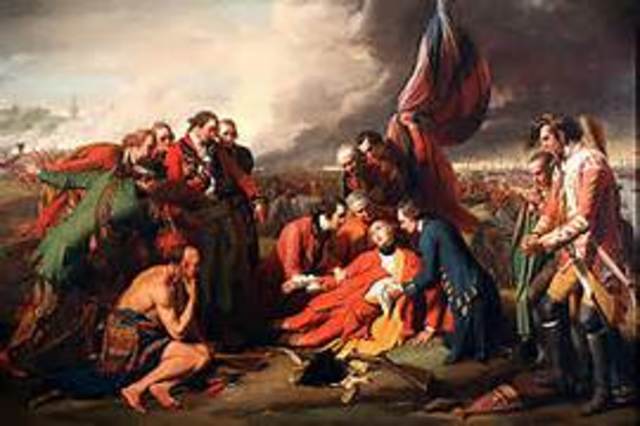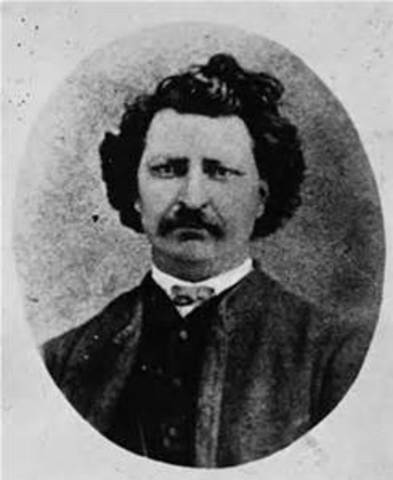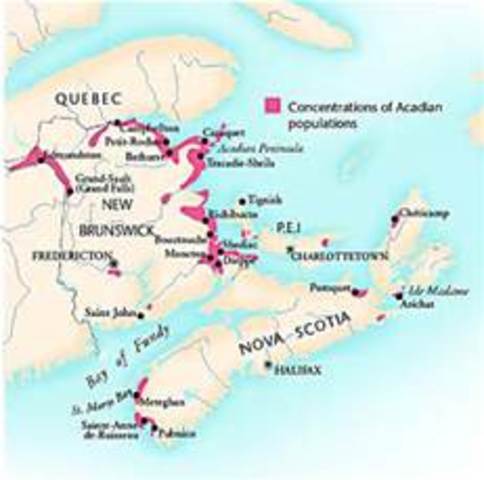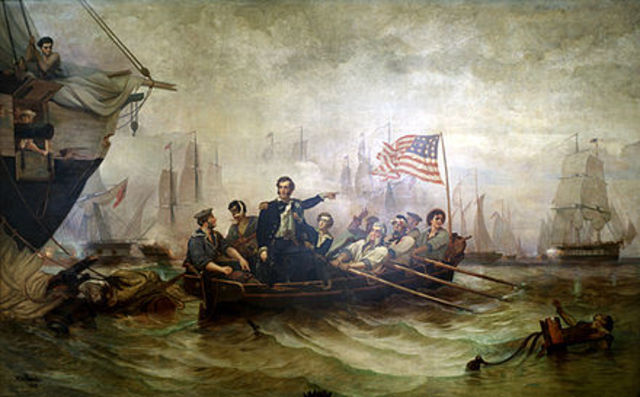|
|
Post by General William T. Sherman on May 1, 2016 2:11:28 GMT
Time for a lecture on Canada, eh? This lecture will go from the Seven Years War to the end of the Cold War.    Top: Wayne Gretzky Top: Wayne Gretzky
Middle: Battle of the Plains of Abraham
Bottom: Louis Riel
This lecture will not just be on Canadian history, however, it will also be on Hockey (Yes, hockey is just that important in Canada). The major events we will discuss are: -The Seven Years War in North America -The War of 1812 -The Canadian Rebellions of 1830-1831 -The Canadian Confederation -Westward Expansion -Northwest Rebellion -Immigration -The First World War -Rising Nationalism and National Identity -The Second World War -The Cold War -History of Hockey -The Greats of Hockey |
|
|
|
Post by General William T. Sherman on May 1, 2016 11:27:11 GMT
Today, the Seven Years War, one of the most important events in Canadian History.  Territory in North America prior to the war Territory in North America prior to the warThe causes of the war are not just in North America, but also in Europe. In Europe, Great Britain had just allied with Prussia, ruled by Frederick the Great. Frederick wished to expand the Prussian nation, specifically to take the region of Silesia from Austria, who was allied with Britain's rival of France. In North America, there were also many other causes for war. The French were currently the dominant country on the continent, with territory from Louisiana to Quebec. The French controlled the Mississippi and Ohio Rivers as well, which was a source of dispute between Great Britain's colonies on the continent and France. Britain wanted access to these rivers as well, and colonists from Britain began to push into French territory. The French decided to begin construction of a fort between the Allegheny and Monangahela Rivers. The British requested they end construction of the fort as they thought it was British territory. When the French refused, a British force, led by George Washington, was sent to ambush the French at Jumonville Glen on May 28th 1754. Washington's forces then retreated to Fort Necessity, but the French followed him and attacked him there on July 3rd. Washington surrendered. The British and the French attempted to negotiate and prevent the incident from escalating, but the skirmish quickly escalated into war. By 1755, full on war was now declared and the French and the British were now killing each other across the globe.  Battle of the Plains of Abraham Battle of the Plains of AbrahamIn the war, the Seven Nations of Canada, the most important being the Huron, Algonquin, and the Abenaki, allied with the French due to the Iroquois's allegiance to the British. This is where the war gets its other name, "The French and Indian War". 1756 and 1757 included early French victories such as the capture of Fort Oswego and Fort William Henry. The capture of Fort William Henry resulted in France's Native American allies pursuing the British after their surrender and killing most of the British who had previously surrendered. The French also defended the Fortress of Louisbourg on Cape Breton Island in 1757, defending Quebec City from naval invasion. In 1758, the Fortress of Louisbourg fell. By 1758, further French reinforcements to North America were blocked following the British naval victory at Cartagena off Spain and the capture of Forts Duquesne and Frontenac. The French were able to close the year with a large victory at the Battle of Carillon where 4,000 French troops defended against 16,000 British. 1859 was the decisive year for the war in North America, as the British won most of the major battles. They took the forts of Niagara and Carillon in July, cutting off French forts in the western frontier, and began a three month siege of Quebec City led by British general James Wolfe. The decisive battle of the North American front was the Battle of the Plains of Abraham, where French forces were kicked out of the city. The French attempted a counter-offensive in 1760, and enjoyed small success at first, but were repulsed. The French retreated to Montreal, where they surrendered to the British on September 8th. Seeing that the French had been defeated, the Seven Nations of Canada signed a peace treaty with the British giving the Native Americans free reign to travel through British territory. In 1762, the French, still having forces in Newfoundland and Labrador, decided to try and take St. Johns in Newfoundland. If they could take the city, it would strengthen the French position at the negotiating table. While they were able to take St. Johns as with the surrounding villages, the British repulsed the French at the Battle of Signal Hill. Following the battle, all French forces in North America surrendered.   Top: The flag of Quebec Top: The flag of Quebec
Bottom: Acadian populations in New Brunswick and Nova Scotia.
The war in North America changed the course of Canadian history forever. The British forcefully deported the French speaking Acadian population of New Brunswick and Nova Scotia, forcing them south to Louisiana where they became the Cajun people of Louisiana. All French territory in North America was ceded to the British with the exception of St. Pierre and Miquelon and some caribbean islands. The war also resulted in the French speaking peoples of Quebec to be placed under British, specifically English speaking, rule, something which the Quebecois would resent for the rest of its history. |
|
|
|
Post by General William T. Sherman on May 1, 2016 13:27:15 GMT
Next time, the War of 1812!
|
|
|
|
Post by Franz von Hipper on May 2, 2016 3:38:53 GMT
General William T. Sherman , If you ever need help about the Canadian stuff, you can always ask me, since was born and I live in Montréal, Québec.
|
|
|
|
Post by Franz von Hipper on May 2, 2016 3:46:20 GMT
Also about the battle of the Plains of Abraham. The battle itself was quite a short affair, lasting around 15 minutes, with both generals, Montcalm and Wolfe dying from wounds resulting from it, Wolfe dying on the Plains and Montcalm the morning after. |
|
|
|
Post by Jean Lannes on May 2, 2016 3:51:09 GMT
General William T. Sherman , If you ever need help about the Canadian stuff, you can always ask me, since was born and I live in Montréal, Québec. Vous parlez français? I believe Canada never lost a war either |
|
|
|
Post by Franz von Hipper on May 2, 2016 9:56:43 GMT
General William T. Sherman , If you ever need help about the Canadian stuff, you can always ask me, since was born and I live in Montréal, Québec. Vous parlez français? I believe Canada never lost a war either Ma première langue est le français Maréchal. You cant really lose if you dont directly participate in many wars eh? |
|
|
|
Post by General William T. Sherman on May 2, 2016 10:11:43 GMT
General William T. Sherman , If you ever need help about the Canadian stuff, you can always ask me, since was born and I live in Montréal, Québec. Vous parlez français? I believe Canada never lost a war either It sort of depends what region or subject you're talking about. Hockey? Multiple have lost their poor lives competing in this brutal war. Also, if you talk to someone who is Métis, they may say they lost the Northwest Rebellion. Probably not tho. |
|
|
|
Post by Franz von Hipper on May 2, 2016 13:13:56 GMT
Vous parlez français? I believe Canada never lost a war either It sort of depends what region or subject you're talking about. Hockey? Multiple have lost their poor lives competing in this brutal war. Also, if you talk to someone who is Métis, they may say they lost the Northwest Rebellion. Probably not tho. I know my hockey quite well, and I support the Habs. And I am quite familiar with Québec nationalism. |
|
|
|
Post by General William T. Sherman on May 4, 2016 21:17:13 GMT
Today, the War of 1812 between the United States of America and the United Kingdom!   Top: Tecumseh Top: Tecumseh
Bottom: British impressment of American sailors.
The causes of the war are numerous, and almost all of which being connected to our good friend, Napoleon Bonaparte! (Damned Bonaparte, why can't you just effect European history?!) The first cause of the war was the British impressment (kidnapping/capture) of American ships and sailors. By 1812, Britain and France, led by Napoleon, were engaged in a long, drawn out war. So far, the war had lasted on and off since 1803, and, by 1812, Napoleon had a clear advantage. The British had to maintain a large fleet in order to prevent a French invasion, and their naval superiority prevented multiple attempted French attacks during the wars, decisively beating back a Franco-Spanish fleet at the Battle of Trafalgar in 1805. British naval superiority came at a heavy cost, however. By 1810, the British began to run out of sailors for their ships, something which was a severe threat to British victory in the wars. Thus, the British decided to turn to impressment, the practice of capturing enemy or neutral sailors in order to use them for your own ships. The British really only did this to the Americans, as the British didn't believe that they were strong enough to really defend themselves from the practice. This deteriorated relations between the two nations. The second cause of the war was American trade policies and attitude toward Napoleonic France. America and Napoleonic France fought a brief naval war in 1801 called the Quasi War, but relations improved immediately following the war. Most Americans supported the French due to their support of them in the War of Independence (Which most Americans of the day had lived through) and the selling of the vast Louisiana Territory to America in 1803 (Fun fact, Louisiana is the only state in the U.S to use Napoleonic Law Code). Due to their good relations, the French and the Americans signed multiple trade agreements. Once the Napoleonic Wars reached their height, however, the British began disrupting American and French trade due to it being a threat to their interests in the war. Many Americans, who believed that free trade was a vital part of freedom itself (something which would also become an important cause of war nearly 100 years later), beat the drums of war and wished to invade the British in order to protect their American interests. Finally, American territorial ambitions and the Native Americans. Following the American War of Independence, many American Loyalists fled to Canada following the war. Most American Patriots, the ones who remained in the USA following independence, believed that the revolution must continue North in order to liberate the rest of the continent from British rule (They were cool with the Spanish, Russians, Danes, Dutch and French though). Many believed that Canada itself was almost an extension of america which had not been liberated following the war, and that most Canadians wanted to join the USA in order to escape the tyranny of Britain. While some Canadians did feel this way, specifically a lot of Quebecois, most were perfectly fine under British rule. The Native Americans were also another issue, as Tecumseh formed an anti-American confederation in areas like Michigan, Wisconsin and Illinois. The Native American Confederation was supported by the British, and, while it is arguable, the British more than likely supplied weapons to the Native Americans. Following the American victory against Tecumseh's forces at the Battle of Tippecanoe in November 1811, the Americans found large amounts of European weapons in the Native American camp. When this news reached the public, the American public was outraged and began demanding war with Britain. While the American Federalists in the Northeast tried to avoid war, the majority of the population, who were Democratic-Republicans, wanted war. On June 18th, 1812, the USA declared war on the UK, beginning the war. Canada would be the main battlefield of the war.   Top: The Battle of Lake Erie Top: The Battle of Lake Erie
Bottom: Franz von Hipper
Canada, initially, seemed like it was easy to be taken over. Most American tacticians believed that most Canadians would join the Americans and rise up against their British rulers, and Thomas Jefferson even said "Conquering Canada is a matter of marching." While much of Canada was populated by former American Loyalists, European migrants who arrived in Canada were believed to aid the Americans. They would soon realize that it would take more than marching to conquer Canada. The initial strategy of the Americans was for a three pronged offensive aiming to take British territory from Detroit, Buffalo and Maine. The first American force invaded British territory on July 12th, 1812, led by General William Hull. Hull's forces were mainly composed of militiamen and untrained rabble. He was able to have initial success, however, using not force, but words. He issued a proclamation which stated that all British or supporters of the British must surrender or be killed. This caused many to defect, but at the same time made the remaining Anglo-Canadian soldiers form a stiffer resistance against the Americans. Isaac Brock, the senior officer in Upper Canada, decided to launch an attack on Detroit in order to prevent any major offensive from that front. Hull's forces, believing that the British had far superior numbers (despite Brock's forces having near equal amount of men as Hull), Hull retreated from Canada and also Detroit to avoid a battle with Brock. Detroit was occupied by Brock's forces on August 16th, 1812. The British also won another victory to the North, near the upper peninsula of Michigan. British forces at St. Joseph Island on Lake Huron learned of the start of the war before the American garrison at the trading post at Mackinac Island in Michigan. The small force at St. Joseph Island landed on Mackinac Island with one cannon on July 17th. The British fired one shot from the cannon, and, being completely bewildered by the attack, the American garrison surrendered immediately. The fort gave control of the fur trade to the British for the rest of the war, something which was vital to the American economy at the time. After Hull's surrender at Detroit, General William Henry Harrison was given command of the American forces in the Northwest. The top priority for Harrison was to retake Detroit from the British, now defended by Colonel Henry Procter and Tecumseh after Isaac Brock was moved to the east near Buffalo. Harrison's campaign to retake Detroit ended at Frenchtown on the River Raisin on January 22nd, 1813. The British had a meager force guard the American prisoners, which resulted in many of Tecumseh's forces massacring most of the American prisoners. This would become known as the River Raisin Massacre, and "Remember the River Raisin!" became a rallying call for Harrison's forces. The British, with their Native American allies, now attempted to take Ohio from the Americans. They first tried to capture Fort Meigs in May, in the Northwest of the state. American reinforcements arriving to the fort were defeated by the Native Americans, but the Fort held out. Eventually, Procter and Tecumseh had to fall back. They tried to capture the Fort again in July, but were repulsed. In order to improve Native American morale, Tecumseh and Procter tried to storm Fort Stephenson, a small American outpost on the Sandusky River, only to repulsed with heavy losses. The Americans were finally able to deal a decisive blow to the British at the Battle of Lake Erie on September 10th, 1813. Led by Colonel Oliver Hazard Perry, the Americans gained control of the lake for the rest of the war, improved American morale, and forced the British to retreat from Detroit. Following the British withdrawal from Detroit, Harrison commenced another invasion of Canada, which ultimately resulted in the U.S victory at the Battle of the Thames on October 5th, 1813. This battle resulted in Tecumseh dying in battle. (More to be added later) |
|
Talleyrand (Salazar)logged out
Guest
|
Post by Talleyrand (Salazar)logged out on May 5, 2016 11:33:23 GMT
Vous parlez français? I believe Canada never lost a war either Ma première langue est le français Maréchal. You cant really lose if you dont directly participate in many wars eh? I am quarter French *hon hon*. I speak the language but not very well, still way better than the European standard who can not even pronounce the word ''bourgeoisie'' well. |
|
|
|
Post by General William T. Sherman on May 5, 2016 20:02:12 GMT
Ma première langue est le français Maréchal. You cant really lose if you dont directly participate in many wars eh? I am quarter French *hon hon*. I speak the language but not very well, still way better than the European standard who can not even pronounce the word ''bourgeoisie'' well. Tu as hollandais mais tu parle français? Monsieur Franz von Hipper, tu parle français de france ou français de québec? |
|
|
|
Post by Franz von Hipper on May 5, 2016 20:16:18 GMT
I am quarter French *hon hon*. I speak the language but not very well, still way better than the European standard who can not even pronounce the word ''bourgeoisie'' well. Tu as hollandais mais tu parle français? Monsieur Franz von Hipper , tu parle français de france ou français de québec? Francais du Québec, puisque je viens de là. |
|
|
|
Post by General William T. Sherman on May 5, 2016 20:39:40 GMT
Tu as hollandais mais tu parle français? Monsieur Franz von Hipper , tu parle français de france ou français de québec? Francais du Québec, puisque je viens de là. Je voyage Québec à deux mille quatorze. C'est très beau! La poutine est délicieux aussi. (Sorry if there are inaccuracies in this, I am still taking French in school) |
|
|
|
Post by Franz von Hipper on May 5, 2016 20:54:44 GMT
Francais du Québec, puisque je viens de là. Je voyage Québec à deux mille quatorze. C'est très beau! La poutine est délicieux aussi. (Sorry if there are inaccuracies in this, I am still taking French in school) I can see the average english speaker mistakes in there (feminine, masculine), but otherwise its a good effort for someone who is just starting. |
|